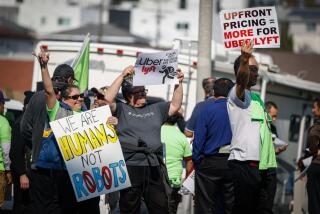Tanks Roll Over French Barricades : Protest: As economic fallout increases, defiant truckers ignore settlement offer and continue blockade of many roads.
- Share via
PARIS — French riot police using army tanks succeeded in clearing truck barricades from most major highways Tuesday, but many protesting truckers ignored a government settlement offer, continuing a nine-day road blockade that has paralyzed cross-country road travel, stranded thousands of vacationers and forced industries to lay off workers.
What began as a protest by truckers against new traffic safety laws broadened last week into a major labor action that has already cost the farming and manufacturing sectors of France and neighboring European countries the equivalent of hundreds of millions of dollars. Late Tuesday, key roads remained blocked in the Rhone Valley and the Burgundy and Champagne regions of France.
On Tuesday, the French car manufacturer Peugeot announced layoffs of 4,000 workers in its Mulhouse plant in the Alsace region because of supply shortages. One of the country’s largest chicken producers, Jean-Michel Soulat in Montfavet, near Avignon, said he faces the loss of 450,000 birds if the blockade is not lifted.
“We can hold out only two more days before the birds die of starvation or start eating each other,” Soulat said.
At least one trucker was accidentally killed and several injured as clashes between police and strikers and between striking and non-striking truckers intensified. In Lyon on Tuesday, helmeted riot police charged a group of truckers who had opened valves on a gasoline tanker truck, spilling fuel.
Gasoline shortages were common in many cities, and the country’s tourism industry warned of a catastrophe.
Resort hotels on the Mediterranean coast, normally full this time of year, reported that occupancy rates had dropped to below 50%. Grocery stores all over France posted signs apologizing for shortages of many products, and restaurant owners scratched items ranging from snails to fresh fruit from their menus.
Even the annual bicycle race the Tour de France was affected. American three-time champion Greg Lemond blamed the trucker’s blockade for his poorer-than-expected early showing in the three-week race, which began Sunday in the Pyrenees mountain range between France and Spain.
On his way to the start of the race in San Sebastian, Lemond found himself trapped by blocked streets in Paris. “The trucks blocking the roads, the airplanes that didn’t take off, the trains where you couldn’t find a seat all caused problems,” Lemond said.
Government officials hoped that a settlement negotiated early Tuesday morning would end the blockade. The government pledged to reduce working hours and require employers to place fewer time pressures on the long-haul truckers. According to truckers unions, average wages for drivers vary between $1,200 and $1,300 a month. But most companies offer big bonuses to drivers who meet or beat delivery deadlines. Safety groups contend that the bonus system encourages dangerous high-speed driving.
Despite other concessions, French government negotiators refused to bend on the main safety requirement that sparked the blockade, a new law instituting a traffic violation point system that the truckers contend will cause many people to lose their licenses. French traffic safety groups, horrified by the extremely high French highway death toll of nearly 10,000 last year, lobbied for the point system that already exists in most other Western European countries. About 15% of the road deaths involved heavy trucks.
At the end of the day Tuesday, Interior Ministry spokeswoman Sophie Reims claimed that “the situation has greatly improved.” In particular, the main highway linking Paris and the northern city of Lille was reported open.
But key routes between the Burgundy city of Beaune and Lyon, roads in the Champagne region near Reims and the main highway in the Rhone Valley remained totally blocked.
More to Read
Sign up for Essential California
The most important California stories and recommendations in your inbox every morning.
You may occasionally receive promotional content from the Los Angeles Times.











